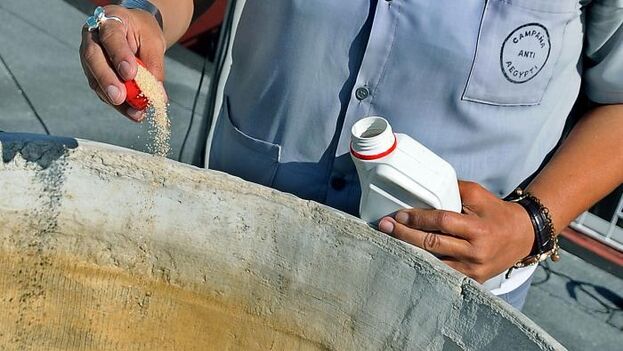
![]() 14ymedio, Havana, 16 February 2023 — BioCubaFarma hopes that this year they will finally have the first vaccination candidate against dengue, after almost a decade of research, Eduardo Martínez Díaz, president of the state pharmaceutical group, told the official press on Thursday.
14ymedio, Havana, 16 February 2023 — BioCubaFarma hopes that this year they will finally have the first vaccination candidate against dengue, after almost a decade of research, Eduardo Martínez Díaz, president of the state pharmaceutical group, told the official press on Thursday.
In 2013, Cuba began the first studies to develop a vaccine against the virus transmitted by mosquitoes of the Aedes aegypti species. In an interview with the official newspaper Granma, Martínez Díaz justifies the delay in the research, saying “it is a complex process,” because dengue has four serotypes and each one must be immunized against at the same time for the drug to be effective.
Although the Government in Havana reiterates that there is currently “no effective and safe vaccine,” in December 2015 the World Health Organization (WHO) approved the first dengue vaccine with the trade name of Dengvaxia, manufactured by the French company, Sanofi Pasteur. This serum has been approved in 20 countries but is not available in Cuba. WHO points out that this drug is aimed at people aged 9 to 45, living in endemic areas and who have had at least one episode of a previous infection.
Guadalupe Guzmán Tirado, director of the Research Center of the Pedro Kourí Institute of Tropical Medicine (IPK), also said that Cuban scientists have dedicated “decades of work” to controlling the disease. An example of this, she continued, is that Cuba contributed to the new classification of dengue with or without warning signs from the WHO.
The president of BioCubaFarma said that by 2023 a rapid dengue diagnosis system will also be launched, developed by the Immunoassay Center, which will identify if a patient is infected with the virus from the appearance of the first symptoms. This will facilitate a differentiated treatment for patients and prevent the worsening of the disease, the executive insisted, without committing to a date for its application.
Martínez Díaz believes that these measures “will have a significant impact” on Cuban families, overwhelmed by the lack of medications and shortages in the hospital network, which doesn’t have the supplies needed to care for patients.
The highest peaks of dengue infections occur between September and November of each year, coinciding with winter on the Island. The disease is a public health problem for most countries in Latin America and the Caribbean, although the Government maintains that dengue hemorrhagic fever was introduced in 1981 by Eduardo Arocena, a Cuban convicted of terrorism in the United States who was released in 2021 after almost 40 years in prison.
The Cuban regime kept the number of active cases on the Island a secret in 2022, but the provincial press gave clues to the severity of the disease. One of the provinces with the highest incidence was Santiago de Cuba, which reached figures not seen in 15 years and the highest number of outbreaks from the transmitting mosquito.
The majority of confirmations of deaths associated with the virus transpired on social networks, and among the deceased there were also several health professionals. The crisis is aggravated every year by the lack of the Abate pesticide, insecticides and even fuel to fumigate or transport doctors to the areas with the greatest presence of the mosquito.
Even health care centers have not been spared the proliferation of outbreaks. A patient from the 14 de Junio Polyclinic, in Havana, told this newspaper that the rooms with electric beds, which are supposed to be dark rooms and free of infection, are populated by these insects. The woman arrived for an evaluation of her feet, but at the end of the exam “there were five mosquito marks. The mosquitoes nest in the bottom of the machines in the room. When they turn them on, they come out,” she said.
Translated by Regina Anavy
____________
COLLABORATE WITH OUR WORK: The 14ymedio team is committed to practicing serious journalism that reflects Cuba’s reality in all its depth. Thank you for joining us on this long journey. We invite you to continue supporting us by becoming a member of 14ymedio now. Together we can continue transforming journalism in Cuba.
